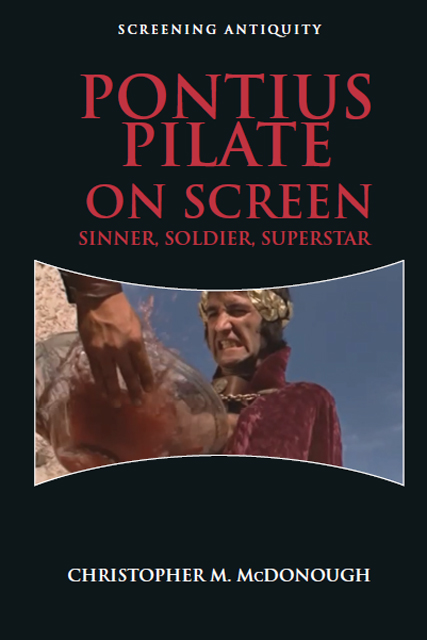Book contents
- Frontmatter
- Contents
- List of Figures
- Acknowledgements
- Series Editors’ Preface
- Frontispiece
- Prologue: ‘Do You Enjoy Being a Symbol, Pontius?’ The Trial of Pontius Pilate and Governor Collins
- 1 Quod Scripsi Scripsi
- 2 The Silent Pilate
- 3 The Roman in the Living Room: Pilate on TV in the Early 1950s
- 4 Mrs Pilate: Claudia Procula and Clare Boothe Luce
- 5 Pilate in CinemaScope, or Notes on Roman Camp
- 6 Finding Meaning in the Middlebrow: Pilate in the 1960s
- 7 What Is Truth? Pilate as 1970s Moral Relativist
- 8 Michael Palin’s Accent in Monty Python’s Life of Brian, and a Few Others
- 9 Grand and Not-So-Grand Inquisitors of the Reagan Age
- 10 ‘We at War’: Pilate for the New Millennium
- Epilogue: A Time of Handwashing
- Works Cited
- Index
9 - Grand and Not-So-Grand Inquisitors of the Reagan Age
Published online by Cambridge University Press: 03 June 2023
- Frontmatter
- Contents
- List of Figures
- Acknowledgements
- Series Editors’ Preface
- Frontispiece
- Prologue: ‘Do You Enjoy Being a Symbol, Pontius?’ The Trial of Pontius Pilate and Governor Collins
- 1 Quod Scripsi Scripsi
- 2 The Silent Pilate
- 3 The Roman in the Living Room: Pilate on TV in the Early 1950s
- 4 Mrs Pilate: Claudia Procula and Clare Boothe Luce
- 5 Pilate in CinemaScope, or Notes on Roman Camp
- 6 Finding Meaning in the Middlebrow: Pilate in the 1960s
- 7 What Is Truth? Pilate as 1970s Moral Relativist
- 8 Michael Palin’s Accent in Monty Python’s Life of Brian, and a Few Others
- 9 Grand and Not-So-Grand Inquisitors of the Reagan Age
- 10 ‘We at War’: Pilate for the New Millennium
- Epilogue: A Time of Handwashing
- Works Cited
- Index
Summary
In the deep darkness, the iron door of the prison suddenly opens, and the old Grand Inquisitor himself slowly enters carrying a lamp. He is alone, the door is immediately locked behind him. He stands in the entrance and for a long time, for a minute or two, gazes into [the prisoner’s] face. At last he quietly approaches, sets the lamp on the table, and says to him: ‘Is it you? You?’ But receiving no answer, he quickly adds: ‘Do not answer, be silent. After all, what could you say? I know too well what you would say. And you have no right to add anything to what you already said once. Why, then, have you come to interfere with us?’
– Fyodor Dostoyevsky, ‘The Grand Inquisitor’, from The Brothers Karamazov‘Jesus is “in” these days’, Richard Cardinal tells Daniel in Jesus of Montreal (Jésus de Montréal), a critically acclaimed drama from 1989 by Quebec filmmaker Denys Arcand. ‘But you’ll have to do the weekend talk shows’. Daniel (Lothaire Bluteau) plays an actor in the film who is starring in a radically innovative Passion play of his own composition that tout le monde is buzzing about, while Richard (Yves Jacques), with a distractingly attractive young woman of seventeen on his arm, is talking to him about career opportunities. A commanding view of the city unfurls in the distance behind them as they stroll along the floor of the lawyer’s skyscraper office. Although it is set in a Canadian city, as the title makes clear, it is the culture of 1980s materialism spreading from south of the border that is the movie’s principal topic. Arcand’s previous film, titled The Decline of the American Empire, had starred some of the same actors and dealt with some of the same moral issues, but Jesus of Montreal is a far more allegorical movie. In this scene, Richard exemplifies everything the director is striving against, in a way that is simultaneously heavy-handed and light-hearted. If Daniel is Jesus in Arcand’s telling, Richard is certainly ‘the devil who took him to a very high mountain and showed him all the kingdoms of the world and their splendour’, as we read in the Gospels of Matthew (4:8) and Luke (4:5).
- Type
- Chapter
- Information
- Pontius Pilate on ScreenSinner, Soldier, Superstar, pp. 198 - 227Publisher: Edinburgh University PressPrint publication year: 2022



